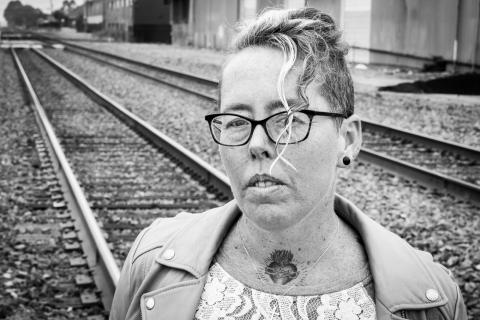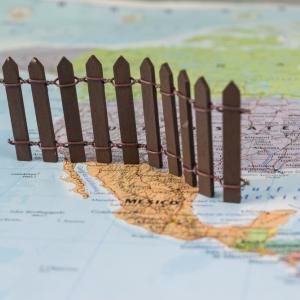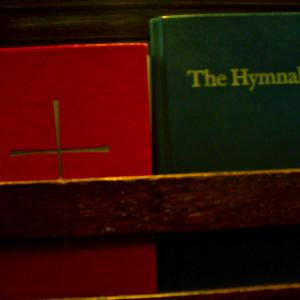
Dani Gabriel is a writer and lives with her partner and two kids in the Bay Area. She is a postulant for the diaconate in the Episcopal Diocese of California. You can find more of her work at allthepossible.com.
Posts By This Author
Overcoming the Borders in People's Hearts Through Interfaith Organizing

Image via Wael Alreweie/Shutterstock
Lee: I would like faith communities to stretch themselves. We are being called to stretch. So much is being tested and contested in our political world and in the world that we're living. Some faith communities are feeling it very directly and some may be insulated from it, but I think our invitation to faith communities is to be willing to take some leaps of faith and to step off the curb. Get out of our comfort zones. These are extraordinary times and we're going to have to push ourselves to respond to these extraordinary times with equal measure. That’s going to mean trying things we haven't done before.
Where Faith-Based and Secular Organizers Find Common Ground
I think Christians have to do organizing, because it helps us to broaden whatever kind of tunnel vision some of our own traditions unwittingly produce in this fundamentalist age. I often tell my congregation that organizing, justice work, is essential for Christian discipleship, because it helps our heart become less wicked. It puts you in relationship and conversation with both systems and individuals that you may need to learn from, or you may need to help transform. I think organizing is critically important in that way.
How Faith Informs Community Organizing
Gabriel: How do we navigate the differences between faith based and secular organizing?
Gomez: There is some power in faith based organizing. I saw 13 or 14 ministers and rabbis show up at the Oakland Airport, and hold an action, literally did a sit down around deportation, and the police did not mess with them at all. And so, I think that there's power in that. There's power in saying we are God's people and we have chosen to participate in an action, on whatever issue it is. It says if you touch us, know that what you're actually doing is you are touching the people of God. And so, I do think that it's a strategy.
But I find it very ironic when I see people of the cloth who are fighting for the rights of LGBTQ people, knowing that the Bible is often used as the deterrent to actually accepting LGBTQ people. And yet we need that, right? If we're ever going to change the face of what is good and holy, we need those people. We need those people to have our backs.
Why the Episcopal Church Is Changing the Book of Common Prayer

Image via Flikr/ Mary Constance
Meyers: A revised prayer book could give us new ways of imagining God and understanding ourselves as children of God. It could be a real force for proclamation of the gospel to people who don’t necessarily think of themselves as Christian. I think it can give us a much deeper understanding and appreciation of creation and our role in caring for creation. We have some of that in the prayer book now, but in a time when the world is literally on fire and we are at a huge ecological crisis, it could, because of the power of language, subtly reshape our understanding and relationship to the world in which we live in a way that might enable us to take better care of it.
Retraining Ourselves: How This Church Is Divesting From Calling the Police
These recent events have catalyzed a movement, inspired by the leadership of members of color at First Congregational Church in Oakland, Calif., to encourage churches to divest from police. This means churches will stop calling the police and will start hosting activities to promote alternatives, such as restorative justice circles, self-defense classes, and mental health de-escalation trainings.
Why I Led a Renaming Ceremony for My Young Transgender Congregant

Image via @lil_bear_photo/Unsplash
"We experience being known in many different ways: in baptism, whether as infants or children or adults, in confirmations, in ordinations, in weddings. We haven't had anything for people who have transitioned to change their name or ask that we use different pronouns for them. Yet this is obviously a really profound shift in who they understand themselves to be. It’s important for the church to affirm that identity, and name it as good."
A Blessing for My Transgender Son
My son Samson stood in front of our pew. One of the men in the congregation knelt and fixed his bow tie. The Sunday morning sunlight was streaming through the stained glass and the skylight. I hugged friends.This is going to be good, right? I prayed . Please, Lord, I hope we’re doing the right thing.
On Aug. 13 we renamed and blessed my son, Samson Red Gabriel. Samson is transgender. That week we had gone to court to legally change his name and gender, and that week he turned 10. That Sunday held the joy of five baptisms, all the hilarity and devotion that goes along with that, and this incredible rite that had never been done before in the Episcopal Church. As far as we know, nothing like it had been done for a child in a mainline church before, period.



